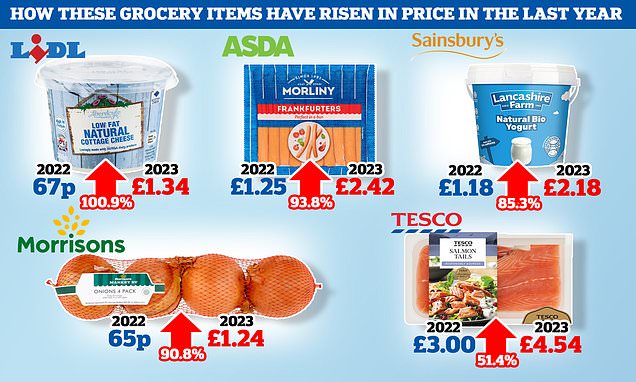Cost of meat, veg and yoghurt DOUBLE in a year amid rampant inflation – here are the food essentials which have seen prices skyrocket in the past 12 months
- Consumer watchdog urges PM to intervene on behalf of struggling shoppers
- ‘Farm to Fork Summit’ brings together industry bosses at Downing Street today
Supermarket food basics including meat, yoghurt and vegetables have doubled in price since last year, new figures show.
Consumer watchdog Which? urged Prime Minister Rishi Sunak to intervene on behalf of struggling shoppers as its latest data shows food inflation remains at ‘shockingly high levels’.
The figures come ahead of today’s Downing Street ‘Farm to Fork Summit’, bringing together farmers’ representatives and food and retail trade bodies along with supermarket chiefs to talk about the Government’s goal of boosting cooperation across the supply chain, the sector’s resilience and rampant food inflation.
The Which? analysis of April prices on more than 26,000 food and drink products at Aldi, Asda, Lidl, Morrisons, Ocado, Sainsbury’s, Tesco and Waitrose found inflation in categories that have previously seen the highest rises – including milk, butter and bakery items – has eased slightly.
Overall inflation has also started to ease slightly, from 17.2 per cent in March to 17.1 per cent to the end of April, according to the tracker.

However other essential food groups like meat, fish and vegetables have continued to rise month on month.
At Asda, Morliny Frankfurters (350g) rose from an average of £1.25 to £2.42 – a rise of 93.8 per cent – on a year ago.
A pack of four brown onions at Morrisons went from 65p to £1.24, a 90.8 per cent rise over 12 months.
Also at Morrisons, Lancashire Farm Natural Bio Yoghurt 1kg went up from £1.18 to £2.18 over the year, a rise of 85.3 per cent.
Other food categories where inflation continued to rise month on month included juice, chocolate, water, fish, chilled ready meals and cheese.
Which? found Aberdoyle Dairies Natural Cottage Cheese 300g at Lidl had gone from an average of 67p in 2022 to £1.34 this year, a difference of 100.9 per cent.
At Tesco, a 260g pack of own-brand salmon tails rose 51.4 per cent from £3 to £4.54.
Supermarket own-label budget items were up 25 per cent in April on 12 months ago, demonstrating how low-income shoppers are being hit hard by soaring inflation.
Branded goods, meanwhile, showed no change on March, staying at 13.8 per cent higher than last April. Regular own-brand food and premium own-brand food inflation decreased slightly.
Which? called on the Prime Minister to challenge supermarket chiefs to take urgent action to help consumers cope with ‘rampant’ food price increases by ensuring that smaller convenience stores stocked a range of essential budget lines that support a healthy diet, especially in areas where they are most needed.
It has also called for supermarkets to commit to clearer unit pricing, especially on promotions and loyalty card offers, so that people can easily work out which products offer the best value.
Sue Davies, Which? head of food policy, said: ‘It’s very alarming to see products such as meat, cheese and vegetables that people rely on still rapidly soaring in price.
‘As the Prime Minister gathers supermarket bosses today to discuss the problem of inflation, we urge him to ask supermarkets to commit to do much more, including stocking budget lines in convenience stores to ensure easy access to basic, affordable food ranges that support a healthy diet, particularly in areas where people are most in need.
‘Supermarkets must also provide transparent pricing so people can easily work out which products offer the best value.’
Rebecca Tobi, senior business and investor engagement manager at The Food Foundation, said: ‘We know that the current food price crisis is causing a great many households to cut back on essentials.
‘With levels of food poverty among children having doubled in the year to January 2023, government and businesses must act urgently to ensure that everyone can afford and access healthy essentials like fruit and vegetables.
‘If not, we will be seeing the long-term health and economic consequences of the cost of living crisis playing out for years to come.’

Supermarket food basics including meat, yoghurt and vegetables have doubled in price since last year, new figures show
Pressed on the reason for such stark price rises, Minette Batters, president of the National Farmers’ Union (NFU) told Sky News: ‘There’s a real challenge when you look at what has happened.
‘We have had the most affordable food in Europe for a very long time, and we still do have the most affordable food here per income spend and we’re the third most affordable in the entire world.
‘That’s really good for consumers, but these costs, this war in Ukraine is a game changer.
‘Food prices have been low for a very long time, that’s been challenging for everyone in the supply chain.
‘For farmers and growers, all they want is a fair return for what they are doing and for any business, if it is costing you more than you’re selling it for, obviously you’re going to contract, which is why we’re seeing the lowest level of tomatoes and cucumbers, and why we had a billion less eggs last year.
‘We’ve got to find ways of having a food policy and a plan that deals with the things the market doesn’t want to pay for, that eases the cost of inflation, that means we can keep producing more.
‘[We’ve had] weather events that we’re facing into, like Morocco in the early part of the year, everybody faced rationing of salads.
‘We’ve got a great climate here and fundamentally above all else the summit today should be about being really positive about our own production.
‘It’s the largest manufacturing sector, food and drink, and farming is probably the remaining primary manufacturing sector and it goes right across the country so I hope today is a real change of agenda from government and that we’ll have it annually every year.’
How grocery prices have changed over the last 12 months
Inflation by food category
Vegetables – 15.3 per cent
Meat – 15.0 per cent
Fresh fruit – 10.2 per cent
Cheese – 25.5 per cent
Chilled ready meals – 13.9 per cent
Yoghurts – 21.8 per cent
Fish – 16.5 per cent
Energy drinks – 11.1 per cent
Bakery – 19.3 per cent
Cakes and cookies – 19.4 per cent
Savoury pies and pastries – 16.5 per cent
Water – 20.3 per cent
Biscuits – 17.2 per cent
Butters and spreads – 21.6 per cent
Carbonates – 12.8 per cent
Cereals – 16.1 per cent
Chocolate – 15.1 per cent
Crisps – 17.7 per cent
Juice drinks and smoothies – 17.9 per cent
Milk – 22.9 per cent
Inflation by branded and own-label food
Branded – 13.8 per cent
Own-label – 20.2 per cent
Own-label budget – 25.0 per cent
Own-label premium – 13.5 per cent
Inflation by supermarket
Aldi – 22.9 per cent
Asda – 17.5 per cent
Lidl – 24.9 per cent
Morrisons – 18.4 per cent
Ocado – 11.0 per cent
Sainsbury’s – 14.7 per cent
Tesco – 14.5 per cent
Waitrose – 13.1 per cent
Source: Read Full Article


